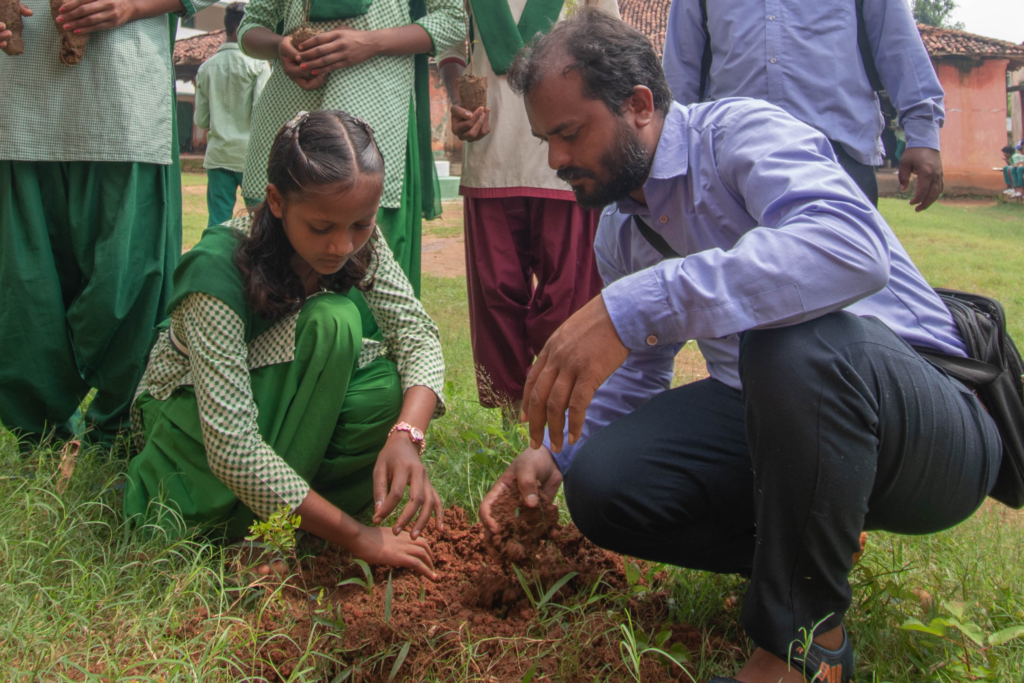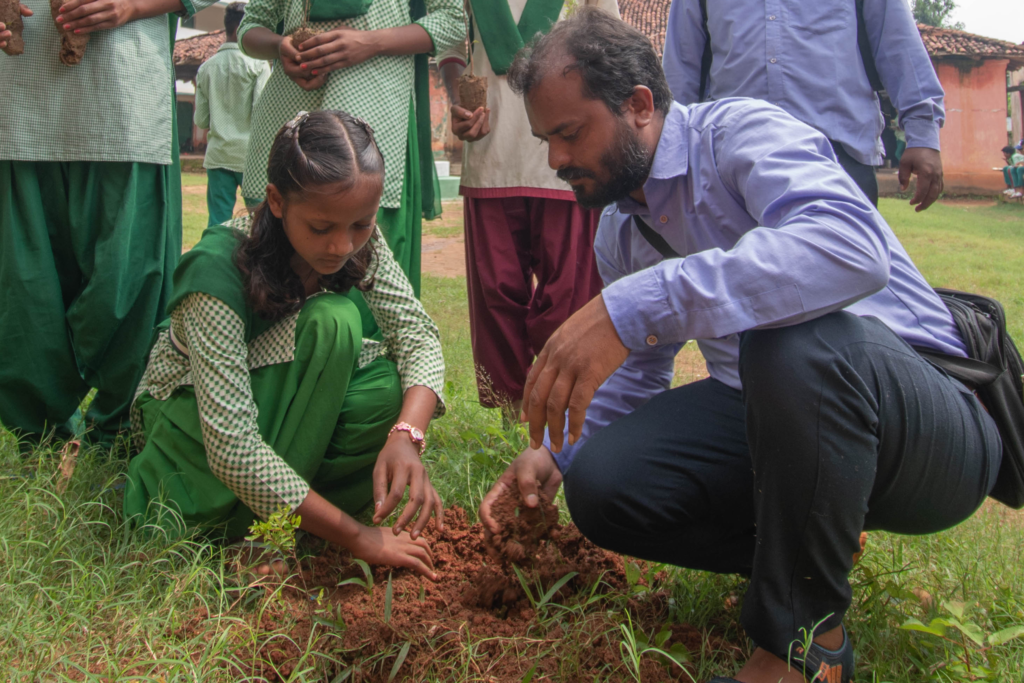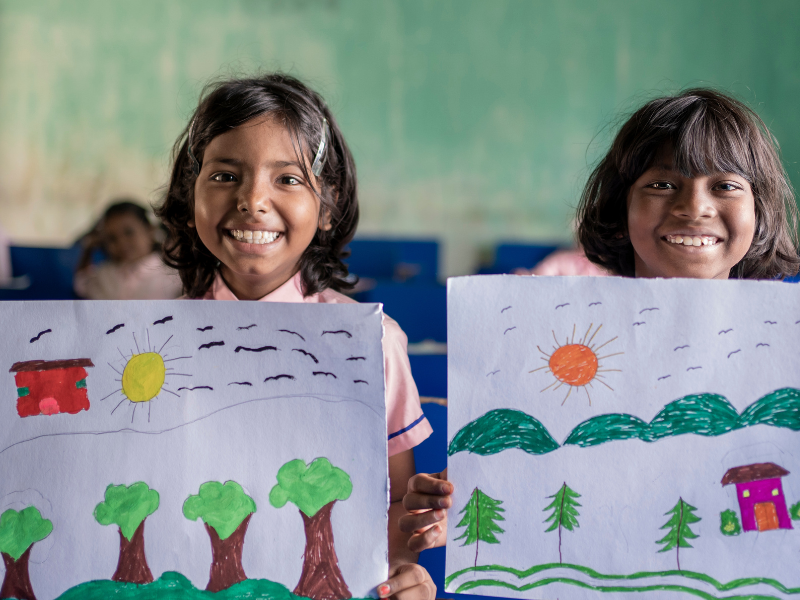The Go Green program encourages students to take action for a safer and greener environment. From waste recycling to the creation of eco-friendly accessories, children embrace sustainable habits with sincere enthusiasm.
Dhannu Majhi, Teacher at Utkramit Secondary School, Jharkhand
Toward a collective awareness for the climate
On May 29, 2024, New Delhi recorded a historic temperature of 52.3°C, a distressing threshold, a stark symptom of the intensifying climate crisis across South Asia and the rest of the world. The consequences of ongoing, destructive human activities — deforestation, industrialization, urbanization — continue to worsen, threatening the delicate balance of life on Earth.
In the face of such urgency, one essential question emerges: How can we begin, today, to nurture a collective awareness rooted in responsibility and reverence for all life?
Planting the seeds of ecological awareness
Since 2013, Karuna-Shechen has been implementing the Go Green program in India, an initiative grounded in the belief that ecological awareness must begin in early childhood. Caring for our planet is not the sole responsibility of policymakers; it is a collective commitment that each person can embody, from the classroom to everyday life, and into society’s broader choices.
Go Green consists of organizing regular environmental awareness activities in rural and urban schools across India, with the goal of nurturing sustainable habits among the next generation.


To grasp the true impact of this initiative, we gave voice to those who witness young people’s awakening to environmental consciousness every day: their teachers.
Initially focused on plastic awareness, the program has gradually expanded its message. Pramod Kumar, principal of the Pawru Secondary School in Jharkhand, has observed the program’s transformative effect on his students over the years. “I still remember the first time Karuna-Shechen reached out to us with the Go Green initiative. It was the same year I joined this school, in 2017. Over time, the message grew from ‘Say no to plastic’ to the broader theme of ‘Sustainable Environment,’” he recalls.
Through engaging activities like drawing, quizzes, and creating eco-friendly crafts, the program nurtures young minds to appreciate the importance of caring for nature. At the end of each Go Green session, each student receives a plant — establishing a tangible, personal connection with the environment. They are also given jute bags, a symbolic reminder to choose sustainable alternatives to plastic.




Kush Pal, a 13-year-old student at Utkramit School, shares his joy: “Reading chapters about environmental issues can be boring sometimes, but the eco-quiz is so much fun! The program made me realize that even small actions matter when it comes to protecting our planet. So, during recess, we take turns watering the school garden. At home, I care for the plant Karuna-Shechen gave us. It’s so exciting to see it grow! I also love the jute bag, we use it a lot at home.”
The role of teachers in environmental awareness
Teachers play a key role in transmitting values of respect, responsibility, and ecological awareness to children. Their dedication lies at the heart of the Go Green program, which they support with attention and commitment each day. Through their eyes, we perceive the full educational and human dimension of this initiative.

Mr. Kumar explains: “Caring for the environment must be practiced, not just learned. Our students study environmental awareness in their textbooks, but Go Green helps them turn that learning into action. Through fun and hands-on experiences, the program plants seeds of change in young minds. Our students love the Go Green competitions, and as teachers, we often help them prepare.”
The Go Green program goes beyond competition, inspiring students to actively care for nature. They now take responsibility for watering and nurturing campus plants, transforming these gestures into living symbols of environmental care. “One moment that made me truly proud,” Mr. Kumar shares emotionally, “was when I saw students collecting fallen leaves and placing them under the trees to create natural compost. That’s the kind of long-term impact Go Green has had.”

Building on these experiences, he has launched debate and essay contests on environmental topics, showing how awareness and action feed into each other. His message is clear: this initiative must continue to inspire both students and teachers to build a future that honors the Earth.

Dhannu Majhi, a teacher at Utkramit Secondary School, also shares his reflections “The love for nature must be cultivated from an early age. School life is the ideal time to educate about the environment, and Karuna-Shechen does this beautifully.”
The Go Green program helps children recognize their responsibilities toward the environment. At our school, we are committed to keeping Go Green’s environmental spirit alive through activities like tree planting and plastic recycling.
Dhannu Manji
Toward a more resilient future
The Go Green program shows that early ecological education nurtures a shared awareness of our interdependence with nature. With its holistic approach, Karuna-Shechen weaves together education, engagement, and a deep respect for life, inspiring both students and teachers to build, hand in hand, a future rooted in harmony with the Earth.
